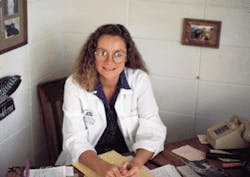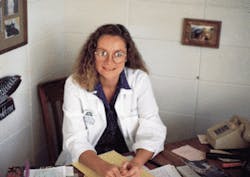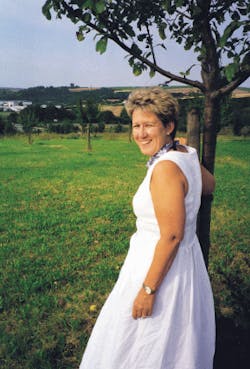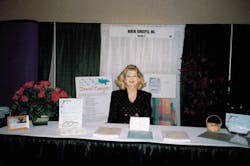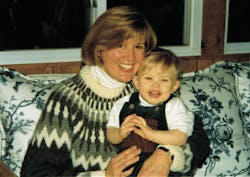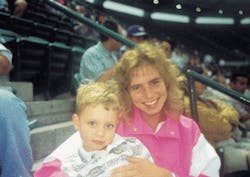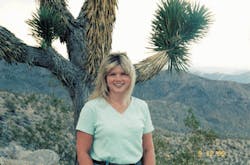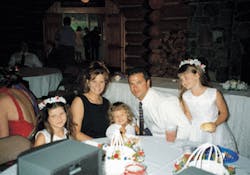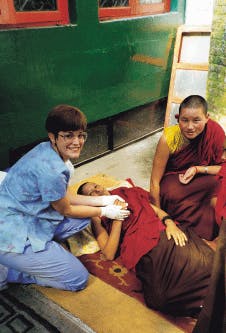Career Moves
Letters reveal how readers enhance their professional lives.
Mark Hartley, Editor
Whenever I pass site surveyors alongside a road, I always crane my neck to briefly watch, risking collisions with the cars in front of me. In my heart, I wish I had been a cartographer in another lifetime. I love to study maps. Last week, I purchased an 1872 map of Missouri and amused myself for several hours by poring over every detail from the state as it existed 128 years ago. Guess I need to work on my social life, huh? I like standing in high places, mentally calculating distance and elevation, and tracing the geographic contours of the countryside. There`s nothing wrong with being the editor of RDH magazine, but it`s a nice fantasy of imagining myself lugging a transit tripod around and charting the landscape.
Dental hygienists typically envision a career beyond chairside hygiene. Often, a switch in focus points to a final destination outside of dentistry altogether. Sometimes it`s a supplemental career that provides self-fulfillment. However, most career transitions take advantage of a hygienist`s expertise in furthering the causes of dentistry.
In this issue, we share comments in letters from hygienists who have enhanced their careers.
The switch to elsewhere
Jill Jarosky-Graf credits a former RDH editor, Irene Woodall, for pushing her to explore dental research, academia, and forensic dentistry. Woodall was her "role model and mentor," Jarosky-Graf wrote. After working as a researcher under Woodall, then teaching and writing about the human anatomy in the university setting, Jarosky-Graf drifted into the world of forensic science. She is currently the chief deputy coroner for Rusk County in Wisconsin.
She recently completed a textbook on dental charting, seeing a need to standardize charting methods in the United States. A side benefit of the book, if implemented, would be aiding forensic identification. The book is based on a system developed by the United States Army Institute of Dental Research and the Armed Forces Institute of Pathology.
"The book is an attempt to remedy the incongruity that currently exists in dental charting," Jaroski-Graf said. "We in the dental hygiene profession can be in the forefront of solving this problem."
She and her husband have a four-year-old daughter and operate a bed and breakfast in northern Wisconsin.
For Rhonda Frazier, the switch to another career path was tragic and undesired. She was happily practicing hygiene in Indiana for most of the 1980s until her father became terminally ill in 1989. He appointed her to become the president of his international water treatment company, Water Energizers, Inc.
"I did not want to leave my hygiene position, but I had no choice," she wrote.
A 1981 graduate from the University of Louisville, the current president and CEO of Water Energizers has found a few ways to sneak dental hygiene into the corporate environment. For example, her previous employer is "only two minutes away" from Water Energizers` headquarters and manufacturing facility. "I am able to occasionally schedule some patients and fill-in for emergencies."
But it`s more than the boss slipping out the back door to work a couple of hours at a dental office. Frazier said her experience as a hygienist leads to opportunities with the company`s clients.
"Once these individuals find out that I`m a hygienist, they always ask questions about their oral health," she said. "They speak freely about their concerns and fears because we are in a nonthreatening environment - such as a conference room, mechanical room, or even the roof of a 20-story building. I have been able to convince them to seek treatment and/or begin a regimen of proper home care. It`s not unusual for me to send a container of floss along with our company`s promotional items to someone I`ve had a `hygiene talk` with!"
Although Frazier misses the days of clinical hygiene, she said her role as the president of a manufacturing facility has broadened her reach as an educator. She wrote, "My impact on oral health used to be limited to the people in several counties in Indiana and Kentucky. Now I have the ability to reach people throughout the United States and in 23 foreign countries.
"I may not be a dental hygienist in the traditional sense, but I continue to use the knowledge I gained in hygiene school and during my years of full-time practice to educate anyone who wants to listen."
Margaret Vivoda is a frequent contributor on a variety of topics on the Internet bulletin boards that cater to dental hygienists. On the local level in Orlando, Fla., though, she`s the one who can get you a job. Vivoda is the owner of Dental Concepts, a staffing agency for dental personnel. She also owns a staffing agency for medical personnel and plans to open an agency for clerical personnel.
A Miami native, Vivoda graduated from Pensacola Junior College and has been practicing for 20 years.
A change of scenery
Seventeen of the 29 years Carol LeMay Bartoschek has devoted to dental hygiene have been on German soil. But when she married a German citizen 17 years ago, she relocated to Wuerzburg, Germany, and began a 10-year stint as a hygienist at a nearby U.S. Army hospital clinic. She has since been promoted to community health dental hygienist overseeing 13 dental clinics scattered throughout Bavaria. The clinics provide preventive dentistry for a military population of 48,000. She also instructs various classes in CPR, well-baby care, and smoking cessation.
European hygienists, according to Bartoschek, lack the cohesiveness provided by a professional trade association.
"Here in Europe, we have always experienced difficulty in obtaining our continuing education requirements," she said. "In order to resolve this, I realized that we needed a voice in the European Military Command and for several years attempted to form a professional association."
After failing to persuade the ADHA to form a European chapter, she formed a private, nonprofit organization that was recognized by the European Military Command.
"In April 1998, while attending a continuing education session for military periodontists, I successfully organized a preliminary meeting with the attending hygienists," Bartoschek wrote. "During this meeting, we approved and adopted a constitution and bylaws, and elected officers. At that meeting, I was elected president of this new professional organization called the European Association of Registered Dental Hygienists."
Diane Brucato-Thomas wrote to RDH from "the café at the edge of the world." She further describes her home base as "12 acres at the edge of a lush 700-feet deep crater, with a view of the ocean on the island of Hawaii." This is the setting for the Hawaii Institute for Wellness in Dentistry, a continuing education sponsor and "think tank" for dental professionals. She managed a continuing education forum aboard a cruise ship that was in conjunction with the American Dental Association`s annual session in 1999.
Brucato-Thomas has been in hygiene for 20 years, serving as an examiner for the Western Regional Examining Board and a clinical instructor at Northern Arizona University. Since relocating to Hawaii from Arizona, she has also explored creative writing, teaching a course to teenagers and having a submission published in the Chicken Soup for the Soul series. Now a student of Hawaiian language, she said her vision "for the future includes sustainable communities that honor diversity, nurturing a high level of self-worth and esteem, a good sense of health and well being, and harmony with the environment."
Relocations also changed the professional lives of two former Connecticut hygienists - Pamela Malamphy and Mary Beth Newport. Malamphy graduated from the Fones School of Dental Hygiene in 1979 and then spent 14 of the next 20 years working for the same general practice. She then joined her husband as he pursued a better employment opportunity in Florida, devoting most of last year to qualifying for a license in the state.
"After successfully obtaining my Florida license, I`m happy to report that I`ve found a new dental home in Naples," she wrote. "While I still miss my previous dental family, I`m enjoying getting to know my new patients and sharing my expertise with them."
Malamphy has three children and remains a self-described "groupie" of the kids. "While the past year was tumultuous, I feel that it was certainly worth every effort. I`ve always felt most fortunate in that dental hygiene has allowed me to perfectly balance my home life and my professional life. I have been able to remain committed to my profession while being a very involved, hands-on Mom. I am grateful to dental hygiene for allowing me the flexibility to achieve so much."
Newport`s exposure to California changed her perceptions about dental hygiene in a dramatic way. She went to school and worked in Connecticut until 1990 when she and her husband decided to attend a two-year Bible school in Anaheim, Calif. They eventually decided to stay in Southern California, and Newport began working on obtaining an expanded functions license, earning it in 1993.
"Now that I can administer local anesthesia, I could never return to practicing hygiene without it. The rewards are too numerous to list. So I strongly recommend any non-expanded functions hygienist to accept a challenge. Get involved in your state to change your laws. You will open many new doors."
She said, for example, that the time saved by anesthetizing her own patients, as well as aiding dentists during restorative procedures, was incalculable. Newport believes the value of the expanded functions license is reflected in California hygienists` stature in the state`s dental community.
"I truly love my career as an expanded functions hygienist," she wrote. "I feel very blessed to be able to practice in California. I hope that many more hygienists can experience the benefits that an expanded functions license offers too."
Tennis, jogging, ice skating, roller skating, ballet, and jazz are among her pastimes, but most of Newport`s private time is devoted to her husband, Don, and son, Mark.
Trish Jones also shares the sentiments stated by Newport, even though Jones` "big move across the country" covered fewer miles - from Illinois to Nevada.
"When I first moved here (Las Vegas), I was in awe of how much respect hygienists receive from our dental colleagues, dentists, and patients," she wrote. "I joke with my family that in Nevada I am legally armed and dangerous, now that I have my license to give local anesthesia."
Las Vegas, of course, is a far cry from Illinois, where she received a degree from Southern Illinois University in 1991. "For the last three years, I have practiced in the entertainment capital of the world, Las Vegas," she said. "Dental hygiene is quite exciting in this town. Never in my wildest dreams did I ever believe an Elvis lookalike would benefit from my services."
She became involved in the local dental hygiene association and is past president of the Southern Nevada Dental Hygienists` Association. She and her husband, Aaron, avoid the tourist trappings of Las Vegas, preferring to sightsee in the surrounding desert.
"There is much beauty to be seen in the desert, if you take the time to see it. Kind of reminds me of dental hygienists - do patients and the public really know what is behind the mask we are camouflaged by? Wish they would take the time to find out."
Articles about missionary dentistry are fairly common in RDH and are, technically, not a career change, but RDH wants to share a letter from Jody Hardwick in Tacoma, Wash. Hardwick joined three other members of the team in her Tacoma office on a journey to Nepal in October 1999. The trip was funded by the employer, Dr. Bob Williams, and the four dental team members provided care to Buddhists monks and nuns in a monastery.
"We took all of our own portable equipment," Hardwick wrote. "I did the anesthetic and restorative work while Dr. Williams did the extractions. We worked with generators and by flashlight. It was the trip of a lifetime for me as a hygienist."
Hardwick, of course, sent the magazine some photographs from the trip, and one caption read, "They said we were so caring that we must be their mothers reincarnated."
Ambitions that never die
Kris Strate is one of many hygienists who see a need for a dental product and then devote time and resources to bring the idea to fruition. After seven years as a dental hygienist, Strate decided to do something about patients` complaints about the "hard-to-reach areas in the mouth."
She designed a "hook-shaped toothpick to reach behind the lower anterior teeth, lingual of molars, around crowns, and other dental work" (a product that has previously been featured in RDH`s Product Report section). She secured a patent, made a mold, located a manufacturer to produce them, and formed Strate Enterprises in the basement of her home in Rose Hill, Kan. She employs physically challenged adults to package the product.
"My advice to anyone is to not let anyone tell you that your idea is crazy," said Strate, who still works part-time at a nearby dental office. "Follow your gut instinct. Let`s continue to find new ideas to better oral hygiene."
Age, as in youthfulness, was the theme of a letter from Stacy Onofrietti in Toms River, N.J. She was a 19-year-old graduate from Middlesex County College in 1995. She quickly earned her bachelor`s degree in dental hygiene, and, at age 23, was offered a clinical instructor position and was accepted into a master`s program for health education.
"It was quite a rough road for me to get where I am today in hygiene because of my age," she said. "However, once people get to know me and see me in action, they usually realize I`m not a kid."
Onofrietti describes herself as a "Jersey girl residing near the [Atlantic] shore." Recently married, she wrote that she combines her education with a 50-hour-work week schedule in private practice.
"I love my career in dental hygiene and plan to pursue it even more in the future as a dental hygiene professor," Onofrietti wrote. "I have learned to have extreme patience for others and be persistent in order to succeed. My determination is also a strength that has already rewarded me."
In its next issue, RDH concludes this series with an article about the "family ties" in dental hygiene.
Jaroski-Graf: Charting forensics
Frazier: CEO misses chairside
Bartoschek: Allies in Germany
Vivoda: Need a job?
Brucato-Thomas: Cafe at the edge of the world
Malamphy: Found a new dental family
Newport: Everyone should expand
Jones: Ditto on expanding
Strate: Ideas aren`t crazy
Hardwick: Mother reincarnated
Onofrietti: An early start
